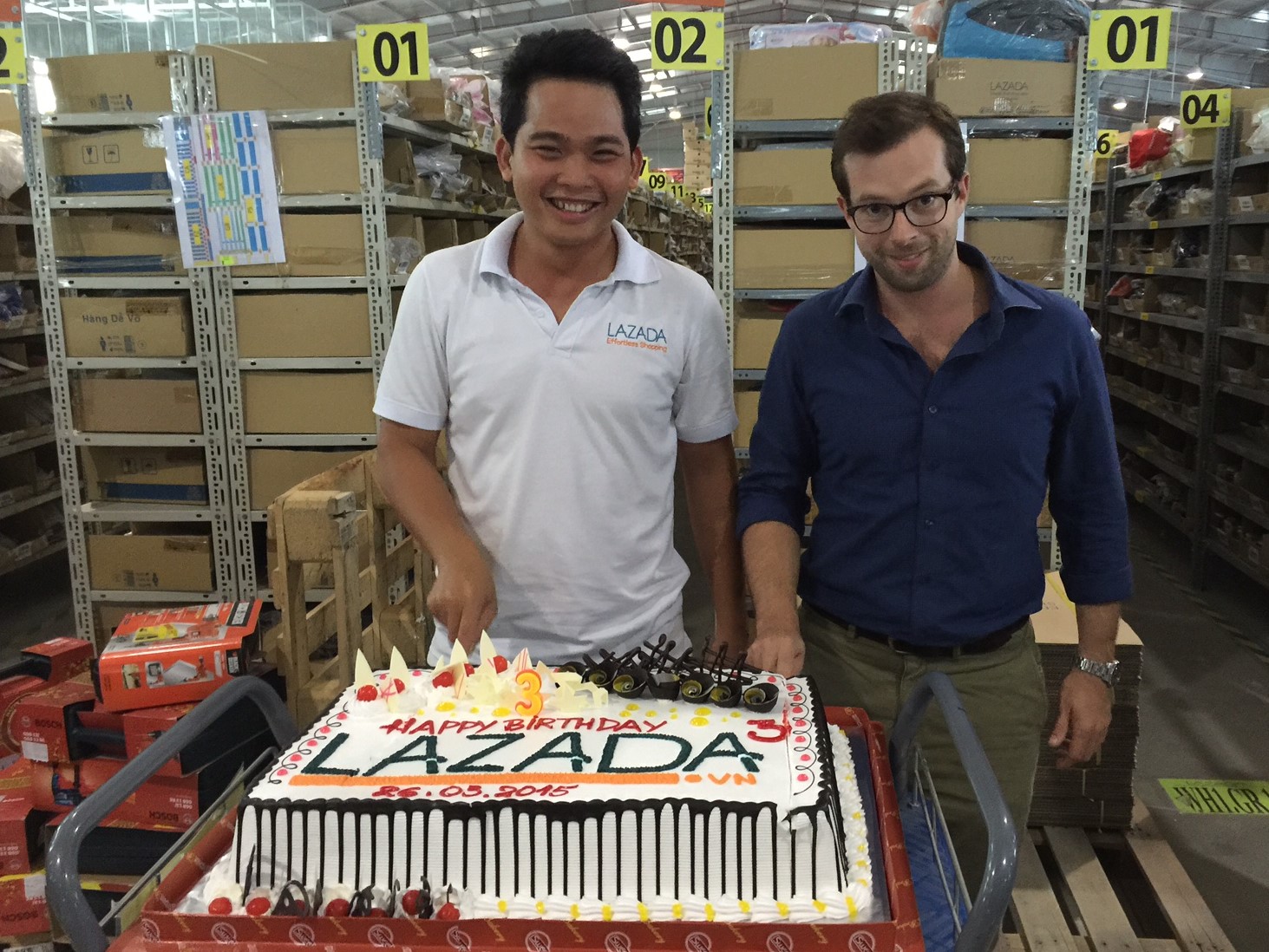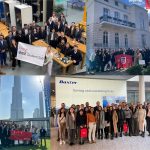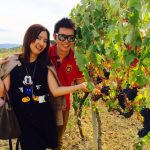In this series, we speak to IESE alumni from around the world to find out about the different paths they have followed and the impact of IESE on their lives.
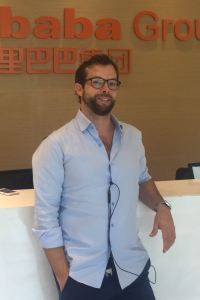
Name: Gerald Glauerdt
Year of Graduation: 2011
Nationality: German
Country of Residence: Singapore
Current Employer: LEX (Lazada Express)
Tell us a little bit about you and how you got to where you are now?
I was working in L.E.K. Consulting in Munich and Boston before I decided to do my MBA at IESE.
I realized during the MBA that I wanted to do something entrepreneurial. I took some entrepreneurship classes and thought, “How do I go about this? I financed my own MBA so how can I re-finance that and start a company without any money?” However, when the consulting companies came to campus, I ended up signing with one of the top global firms based in Munich, which was a safer bet for me at that time to set off my student debt. I stayed for 8 months when I decided that it was not where I wanted to be and finally time for me to leave the consulting world.
After talking to several people and looking around, Rocket Internet approached me. I believe their search criteria were (1) Languages, I spoke Portuguese and they needed to send someone to Groupon in Brazil and (2) an MBA degree – this is where I feel my MBA already helped me.
They asked, “Are you interested? We’ll do a start-up.” I thought to myself, “They seem a bit crazy, but why not?!” Then I met one of the founders. He pitched to me that Groupon in Brazil was quite big already but they needed some support. I told them I was looking to start something from scratch, so I declined. Rocket told me they were launching new ventures in various countries so I met them again soon to discuss. It was Oliver Samwer of Rocket Internet who finally convinced me to join them in Vietnam to start an e-commerce company. He gave me a 5 minute pitch and simply asked me, “Can you do it? When can you start?” I thought about it for a day or two and said “I am in!”
I quit my job in consulting and moved to Vietnam, where I started as Chief Operating Officer for Lazada, the newly founded company with the goal to bring online shopping to the c. 600m population of South East Asia! We had around 400 interns in Saigon, and it was a huge mess: No structure, no IT systems, no finance, no HR, nothing. We launched in 5 countries in South East Asia in 2012 and added Singapore 2 years later.
Soon we realized that transport options were terrible as there was no e-commerce market established yet. So we hired a few motorbike drivers to try and deliver our parcels with our own drivers. It was a “proper start-up” and we were doing all operations out of the office basement initially. We had a lot of things to figure out and ended up hiring more drivers and opened our newly born transport operation in several cities across Vietnam. At that time some people in the company thought we were insane, claiming that we did not want to build a logistics company, but rather should focus on building an e-commerce company. The problem was that back then, there was just not any viable alternative to building this crucial part to the e-commerce supply chain ourselves. Our investors thought that this was actually a great idea because it was creating a barrier of entry to competitors, and it gave us control of the end-to-end customer experience. So the rest of the Lazada countries started to develop their own fleets as well, in Indonesia, Thailand, Malaysia and Philippines.
After ramping up the operations for Lazada in Vietnam for 5 years and bringing it to a quite large size, I decided to get married and move to Singapore for a new role with Lazada Express. This is the company we had by then carved out as a stand-alone entity, delivering hundreds of thousands of parcels to Lazada customers daily across South East Asia. I now take care of Strategy and Business Development for LEX in the whole region to ensure our business can grow and adopts fast to the rapidly changing market conditions. Doubling an asset- and people-heavy business like LEX each year is not an easy task and it requires the right mindset, tools and capabilities.
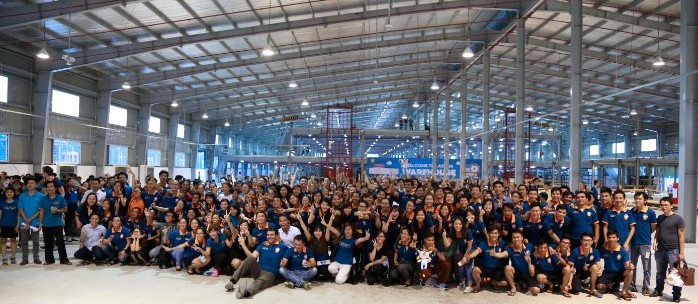
Successfully leading a team in Vietnam
How do you think you’ve changed in your way of leading people or in the company throughout the years? If any, is there anything from the MBA that shaped your view on leadership?
I was thrown in the cold water when I arrived to Vietnam. I had no idea how many people there were in the company that I would be leading. On my first day, I gave a welcome speech and that’s when I realized that I was responsible for around 200 people, most of them interns, but still, or especially, they needed guidance and a vision from me. I wasn’t expecting to lead such a big group of people and I didn’t know how to do it. My only work experience so far had been in consulting where teams are small with 2 or 3 highly educated and driven (and well paid) people in a team. It was a different challenge to lead many, mostly junior people with different skills and backgrounds, but it was exactly the kind of challenge I had missed and that I was looking for. I thought about a lot of things we learnt at IESE, but I think leadership is something you cannot really learn in a book or school. If I said I learned all my leadership skills at IESE, it would not be true but I think what helped me a lot from my time at IESE are the things between the lines – working together in teams which is highly fostered, discussing and coming to a consensus with a group of diverse people from across the world, and trusting each other.
In Vietnam, I had to rely strongly on the local people since I did not understand the language and the culture. I needed that consensus and teamwork or else we would have failed. In Vietnam, business culture is very traditional and hierarchical. It is uncommon for people to voice their ideas or challenge what the boss says. I had to establish that I was fine with my team telling me their thoughts and ideas and encouraged them to do so. This is the only way you can build a strong team; to empower the people and give them responsibility. I am the type of leader who gives people room to let them figure out things for themselves, rather than telling them how everything is to be done. Personally, I had to figure out what kind of leadership style works best for me and works best in this situation. IESE definitely helped me but it is more on the soft skills side and the cultural sensitivity. Being in an extremely culturally diverse environment like IESE was a great experience for me, and it definitely broadened my horizon.
Not only the region, but also the function – logistics – was new to me. I was not a logistics professional. Being flexible and open and to have the confidence to try out new ways was very important to succeed in this role. The bigger we grew, the more I was looking into delegating responsibilities to my team and making them become leaders themselves. When I moved to Singapore, one of my interns took over, he became the COO of Lazada. He is truly “homegrown” and he’s leading the team in Vietnam now. It is great to see how quickly he learned and grew mature to lead such a big and complex team!
Going from Consulting to Entrepreneurship is courageous. If you would look back, what advice would you give yourself in key points in your career?
I would advise myself and everyone else that consulting is a great first job. I do not regret it, it was good for me to have done that. You learn to be structured, to work very hard, (sometimes long nights), to prepare a good presentation, how to do clean excel sheets and build all those models. It’s like a crash course. I would do it again, it’s just not forever for me. I realized I wanted to be closer to the results, closer to where the action is. I wanted to see what impact the decisions have that I make. I wanted to do something more hands-on, more involved with the business and most importantly, I wanted to lead people. Nevertheless, without the preparation in consulting, I would’ve struggled more in my time in Lazada where I simply put together what I had gained in the MBA and in consulting – just driving into the execution part.
What was one thing you had to learn along the way?
In consulting and in the MBA, the environment is more structured. In a setting like Vietnam, you need to learn to manage without full control and full visibility. Some people cannot do it and will completely freak out. They would probably take the next plane back to Europe. This uncertainty and environment where not everything is perfect was actually something I enjoyed a lot. I had to build a team I can trust. KPIs and structure helped to do the rest, but what really matters are the people, as that is what builds a culture, and makes the team and the results successful. Start-ups are ambiguous unlike a consulting company which is structure and control on steroids. Being fine with that and accepting to trust my team was something I had to become familiar with initially.
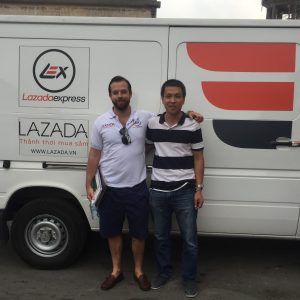
Continuing to create new businesses and embracing the challenges of entrepreneurship in South East Asia!
Let’s talk about the real Return of Investment (ROI) of an MBA. Doing a full-time MBA is a huge investment in time, effort and money – what did you think about this before applying to IESE and today, years after graduation?
My educational background was engineering with management, so most courses in IESE were not entirely new to me. For me the ROI of an MBA is something more long term. It is the network that you build (IESE has an active network in South East Asia) and the super-international-experience that you go through. Also, I would not have gotten the opportunities or the access to these jobs I am in without the MBA. Still, it is really difficult to measure it in terms of financial return in my case. The time off the job during the MBA is a big luxury and the time to reconsider what you want to do, what your real strengths are, and interacting with lots of different people helps you discover what you really want to do. I was able to do all of this during the MBA. It was a time for me to truly reflect on what’s next.
What are you, outside of work? What are you passionate about? What gets you up every morning?
I am passionate about different cultures and travelling. Seeing globalization happen day by day in South East Asia combined with the effects of technology in e-commerce is amazing. For example, Alibaba has now acquired Lazada. It is fascinating to see how Alibaba thinks globally. Alibaba is the largest retailer in the world, but so far mostly present in China. Becoming a true global player is a top priority and Lazada is a core part in that strategy, being the first large e-commerce company controlled by Alibaba outside of China.
I know I’m falling back to work talk now but it almost flows together so it does not feel like work so much. Basically, outside work, what gets me up in the morning is work 🙂 I travel a lot for work, but I also like to explore those countries and cultures that I travel to and I have the luxury to do that often by staying for the weekend or longer. On the weekends, Singapore offers a lot to do, thousands of amazing restaurants, or parks to explore with my wife and friends. On a rainy weekend day, you will probably find me at home, cooking some new recipe.
Thank you Gerald for sharing your story!
Pursue your dream MBA! Take these next steps today:


